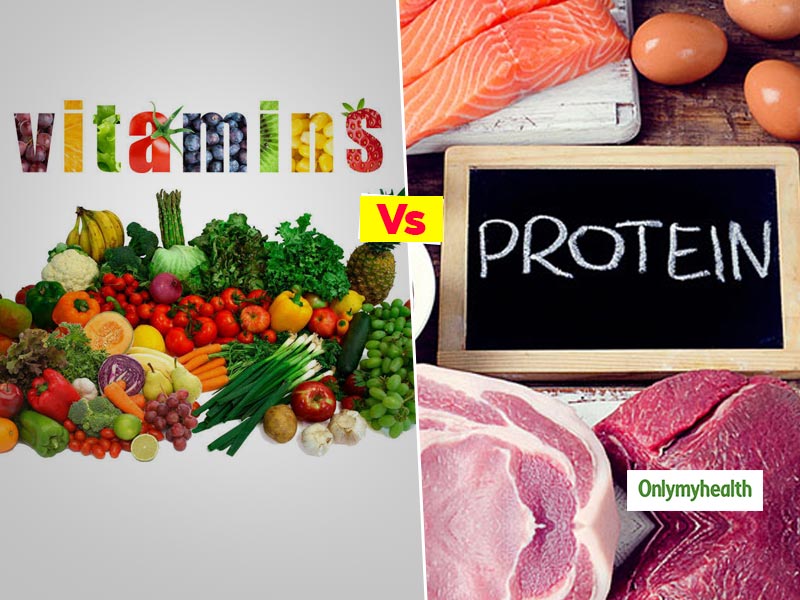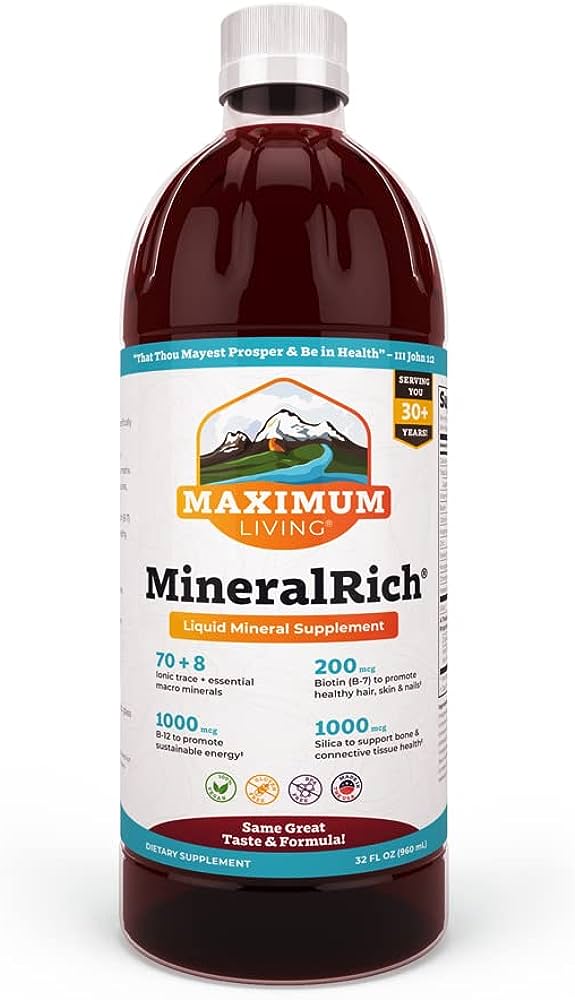Vitamins are organic compounds that are essential for the body’s normal functions, while minerals are inorganic elements required for the body’s overall health and well-being. Both vitamins and minerals play crucial roles in maintaining good health, but they differ in their chemical structure and how they are obtained.
In the human body, vitamins are needed in small amounts to support various physiological processes, such as metabolism, energy production, and immune system function. They are primarily obtained through diet, although some can be synthesized by the body itself. On the other hand, minerals are needed in larger amounts and are involved in processes like bone and teeth formation, nerve function, and fluid balance.
They are obtained through food and water sources. Understanding the differences between vitamins and minerals is important for maintaining a balanced and healthy diet.

Credit: azbigmedia.com
Understanding The Basics
Vitamins and minerals are essential nutrients that play vital roles in maintaining overall health. While they are often mentioned together, it is important to understand the differences between them. In this section, we will explore the definition of vitamins and minerals, the importance they hold for our health, how our bodies obtain them, and the key distinctions between the two.
Definition Of Vitamins And Minerals
- Vitamins: Organic compounds that are required in small quantities to support various bodily functions. They are not produced by the body in sufficient amounts and therefore need to be obtained from our diet or supplements.
- Minerals: Inorganic substances that are essential for physiological processes and are needed in relatively larger amounts compared to vitamins. They can be both macrominerals (required in larger quantities) and microminerals (needed in smaller amounts).
Importance Of Vitamins And Minerals For Overall Health
- Vitamins:
- Act as cofactors in enzymatic reactions, facilitating a wide range of metabolic processes.
- Help maintain healthy skin, eyes, hair, and nails.
- Strengthen the immune system and promote the body’s defense against infections.
- Support the production of energy and enhance cognitive function.
- Minerals:
- Contribute to the structure and function of bones, teeth, and blood cells.
- Aid in nerve signaling and muscle contraction.
- Support fluid balance and regulate blood pressure.
- Participate in the production and activity of hormones and enzymes.
How The Body Obtains Vitamins And Minerals
- Vitamins:
- We derive vitamins from the foods we eat. Different vitamins are present in various food sources, including fruits, vegetables, whole grains, dairy products, and lean meats.
- Some vitamins are also synthesized by the body through exposure to sunlight (e.g., vitamin d).
- Minerals:
- Minerals are obtained from the soil, water, and plants we consume, as well as from animal sources.
- Plants absorb minerals from the soil, which then become part of our diet when we consume these plant-based foods.
- Animals also obtain minerals from their diet, and when we consume animal products, we indirectly acquire these minerals.
Key Differences Between Vitamins And Minerals
- Structure: Vitamins are organic compounds, while minerals are inorganic substances.
- Requirement: Vitamins are needed in small quantities, whereas minerals are required in larger amounts.
- Source: Vitamins are obtained from a variety of foods and can also be produced by the body, while minerals are acquired through plants, animals, and water sources.
- Function: Vitamins are involved in metabolic processes, immune function, and cellular health, whereas minerals contribute to bone health, nerve function, and overall vitality.
Understanding the basics of vitamins and minerals is crucial for maintaining optimal health and well-being. Now that we have explored their definitions, importance, sources, and key differences, we can appreciate the unique roles they play in supporting the overall functioning of our bodies.
By ensuring an adequate intake of both vitamins and minerals, we can contribute to our long-term health and vitality.
Different Types Of Vitamins
When it comes to maintaining good health, vitamins play a crucial role. However, not all vitamins are created equal. There are two main types of vitamins: water-soluble vitamins and fat-soluble vitamins. Understanding the characteristics, examples, benefits, and functions of each type can help you make informed choices about your nutritional intake.
Water-Soluble Vitamins
Water-soluble vitamins are nutrients that dissolve in water and are easily absorbed by the body. They are not stored in large amounts, so it’s important to consume them regularly through your diet. Here are the key points about water-soluble vitamins:
- They are not stored in the body, which means excess amounts are excreted through urine.
- The body needs a constant supply of water-soluble vitamins.
- They include vitamin c and b-complex vitamins (such as b1, b2, b3, b6, b9, and b12).
- Water-soluble vitamins are found in various fruits, vegetables, and whole grains.
Benefits and functions of water-soluble vitamins include:
- Vitamin c boosts the immune system, aids in collagen production, and acts as an antioxidant.
- B vitamins help convert food into energy, support brain function, and promote healthy hair, skin, and nails.
Fat-Soluble Vitamins
Unlike water-soluble vitamins, fat-soluble vitamins are stored in fatty tissues and the liver. They require fat for absorption and are better absorbed by the body when consumed with dietary fat. Here are the key characteristics of fat-soluble vitamins:
- They can be stored in the body for longer periods.
- Excessive intake of fat-soluble vitamins can lead to toxicity.
- The main fat-soluble vitamins are vitamins a, d, e, and k.
- Sources of fat-soluble vitamins include animal products, dairy, and certain plant-based oils.
Fat-soluble vitamins offer several benefits and functions, including:
- Vitamin a supports vision, bone health, and maintains healthy skin.
- Vitamin d helps the body absorb calcium and maintains bone health.
- Vitamin e acts as an antioxidant and helps protect cells from damage.
- Vitamin k aids in blood clotting and bone metabolism.
Both water-soluble and fat-soluble vitamins are essential for overall health. While water-soluble vitamins need to be consumed regularly, fat-soluble vitamins can be stored in the body. Including a variety of foods rich in these vitamins in your diet will help ensure you meet your nutritional needs.
Remember, it’s always a good idea to consult with a healthcare professional or nutritionist for personalized advice on vitamin intake.
Different Types Of Minerals
Minerals are essential nutrients that the body needs in order to function properly. They are classified into two main categories: major minerals and trace minerals. Let’s explore the characteristics, examples, and benefits of each type.
Major Minerals
Major minerals, also known as macrominerals, are needed by the body in relatively large amounts. They play crucial roles in various bodily functions and are necessary for maintaining overall health and well-being. Here are some key points about major minerals:
- Major minerals are required in daily amounts greater than 100 milligrams.
- They include calcium, phosphorus, magnesium, potassium, sodium, and chloride.
- These minerals are essential for proper bone and teeth formation, nerve function, muscle contraction, fluid balance, and energy production.
- Calcium is vital for strong bones and teeth, while phosphorus supports energy metabolism.
- Magnesium plays a role in more than 300 enzymatic reactions in the body, while potassium helps maintain proper fluid balance.
- Sodium and chloride are important for nerve signaling and maintaining proper hydration.
Examples Of Major Minerals
Here are some examples of major minerals along with their sources:
- Calcium: Dairy products, leafy greens, fortified foods
- Phosphorus: Dairy products, meat, fish, nuts, legumes
- Magnesium: Leafy greens, whole grains, nuts, seeds
- Potassium: Bananas, potatoes, avocados, citrus fruits
- Sodium: Table salt, processed foods, condiments
- Chloride: Table salt, sea salt, processed foods
Benefits And Functions Of Major Minerals
Major minerals offer a wide range of benefits and play important roles in the body. Here are the key benefits and functions of major minerals:
- Calcium helps maintain strong bones and teeth, supports muscle function, and helps with blood clotting.
- Phosphorus contributes to bone health, energy production, and dna synthesis.
- Magnesium is involved in protein synthesis, blood pressure regulation, and nerve function.
- Potassium helps maintain healthy blood pressure, promotes proper muscle function, and supports heart health.
- Sodium and chloride work together to maintain fluid balance, transmit nerve impulses, and promote proper muscle function.
Trace Minerals
Trace minerals, also known as microminerals, are required by the body in very small amounts. Despite their small quantities, these minerals are crucial for various physiological processes. Let’s take a look at some key points about trace minerals:
- Trace minerals are required in daily amounts less than 100 milligrams.
- They include iron, zinc, copper, manganese, iodine, selenium, and chromium.
- These minerals are necessary for enzyme activity, immune function, hormone production, and overall growth and development.
- Iron is vital for oxygen transport and storage, while zinc plays a role in immune function and wound healing.
- Copper is involved in the formation of red blood cells and connective tissues.
- Manganese supports bone health, while iodine is crucial for thyroid hormone production.
- Selenium acts as an antioxidant, protecting cells from damage, and chromium helps regulate blood sugar levels.
Examples Of Trace Minerals
Here are some examples of trace minerals and their sources:
- Iron: Red meat, poultry, fish, legumes, leafy greens
- Zinc: Meat, seafood, whole grains, nuts, seeds
- Copper: Organ meats, shellfish, nuts, seeds
- Manganese: Whole grains, nuts, seeds, leafy greens
- Iodine: Iodized salt, seafood, dairy products
- Selenium: Brazil nuts, seafood, meat, poultry, grains
- Chromium: Broccoli, liver, whole grains
Benefits And Functions Of Trace Minerals
Trace minerals play important roles in the body despite their small quantities. Here are the key benefits and functions of trace minerals:
- Iron is essential for the production of hemoglobin, the protein that carries oxygen in the blood.
- Zinc supports immune function, promotes wound healing, and assists in dna synthesis.
- Copper aids in the formation of red blood cells and connective tissues.
- Manganese contributes to bone health and acts as a cofactor for various enzymes.
- Iodine is necessary for the production of thyroid hormones, which regulate metabolism.
- Selenium acts as a powerful antioxidant, protecting cells from oxidative damage.
- Chromium assists in regulating blood sugar levels and may enhance insulin sensitivity.
Major minerals and trace minerals are both vital for maintaining optimal health. Major minerals are needed in greater quantities, while trace minerals are required in smaller amounts. Including a variety of nutrient-rich foods in your diet will help ensure an adequate intake of these valuable minerals, supporting your overall well-being.
Absorption And Bioavailability
How Vitamins And Minerals Are Absorbed By The Body
Vitamins and minerals play crucial roles in the proper functioning of our bodies. While they may seem similar, there are significant differences between the two when it comes to absorption and bioavailability. Here, we will explore how vitamins and minerals are absorbed in the body.
- Vitamins:
- They are organic compounds that our bodies need in small amounts to support various bodily functions.
- They can be categorized into two types: Water-soluble vitamins (b vitamins and vitamin c) and fat-soluble vitamins (vitamins a, d, e, and k).
- Water-soluble vitamins are easily absorbed by the body and are not stored for long periods. They dissolve in water, making them readily available for absorption in the gastrointestinal tract. However, excess amounts are excreted through urine.
- Fat-soluble vitamins, on the other hand, require the presence of dietary fats for optimal absorption. Once absorbed, they are stored in the body’s fatty tissues and liver for future use.
- Minerals:
- Unlike vitamins, minerals are inorganic substances that are essential for maintaining proper bodily functions.
- They can be divided into two groups: Macrominerals (required in larger amounts) and trace minerals (needed in smaller quantities).
- Macrominerals, such as calcium, magnesium, and potassium, are readily absorbed in the small intestine and used by the body for various functions.
- Trace minerals, including iron, zinc, and copper, require lower amounts for proper functioning and are also absorbed in the small intestine.
Factors That Affect The Bioavailability Of Vitamins And Minerals
The bioavailability of vitamins and minerals refers to the degree to which they are absorbed and utilized by the body. Several factors can influence their bioavailability:
- Food sources:
- Consuming vitamins and minerals from whole foods rather than supplements increases bioavailability. Whole foods contain various compounds that enhance absorption and utilization.
- Combining certain foods can also optimize bioavailability. For example, pairing iron-rich foods with vitamin c-rich foods promotes iron absorption.
- Nutrient interactions:
- Some vitamins and minerals have better absorption rates when consumed together. For instance, vitamin d facilitates calcium absorption in the body.
- On the other hand, certain nutrients can inhibit absorption. For example, excessive fiber intake might hinder the absorption of certain minerals.
- Individual factors:
- Metabolic differences between individuals can affect the absorption and utilization of vitamins and minerals.
- Age, health conditions, and medications can also impact bioavailability. For example, individuals with malabsorption issues may struggle to absorb certain nutrients effectively.
Importance Of Consuming Vitamins And Minerals From Food Sources
While supplements can be convenient, obtaining vitamins and minerals from whole foods is crucial. Here’s why:
- Synergy of nutrients:
- Whole foods provide a combination of various vitamins, minerals, and phytonutrients that work together synergistically. This enhances the overall bioavailability and efficacy of nutrients.
- Isolated nutrients in supplements may not have the same beneficial effect as when consumed in their natural food matrix.
- Fiber content:
- Whole foods are typically rich in dietary fiber, which aids in digestion and ensures a slow release of nutrients into the bloodstream. This promotes better absorption and prevents blood sugar spikes.
- Antioxidants and phytochemicals:
- Whole foods contain antioxidants and phytochemicals that offer additional health benefits beyond basic nutrition.
- These compounds help protect against oxidative stress and inflammation, reducing the risk of chronic diseases.
While vitamins and minerals have unique absorption mechanisms, their bioavailability can be influenced by various factors. Prioritizing a balanced diet that includes a wide variety of nutrient-dense whole foods is key to ensuring optimal absorption and reaping the many benefits of these essential nutrients.
Deficiencies And Excess
Vitamins and minerals play essential roles in our overall health and well-being. While they are both micronutrients, there are some key differences between the two. In this section, we will explore the common deficiencies of vitamins and minerals, the symptoms and health problems associated with their deficiencies, and the dangers of excessive intake.
Common Deficiencies Of Vitamins And Minerals
- Vitamin d deficiency: Lack of exposure to sunlight and limited dietary intake can lead to vitamin d deficiency.
- Iron deficiency: Iron is crucial for the production of red blood cells, and its deficiency can cause anemia.
- Vitamin b12 deficiency: Vegetarians and vegans are more prone to vitamin b12 deficiency as it is mainly found in animal products.
- Calcium deficiency: Inadequate calcium intake can lead to weakened bones and increased risk of osteoporosis.
- Vitamin c deficiency: Insufficient intake of vitamin c can compromise the immune system and lead to scurvy.
Symptoms And Health Problems Associated With Deficiencies
- Vitamin d: Fatigue, muscle weakness, bone pain, and increased risk of falls and fractures.
- Iron: Fatigue, weakness, pale skin, shortness of breath, and impaired cognitive function.
- Vitamin b12: Fatigue, weakness, numbness or tingling in the hands and feet, and memory problems.
- Calcium: Brittle bones, frequent fractures, muscle cramps, and osteoporosis.
- Vitamin c: Fatigue, weakened immune system, slow wound healing, and swollen or bleeding gums.
Dangers Of Excessive Vitamin And Mineral Intake
While adequate intake of vitamins and minerals is important, excessive intake can be harmful. Here are a few examples:
- Vitamin a: Excessive intake of vitamin a can cause dizziness, nausea, hair loss, and in severe cases, liver damage.
- Iron: High levels of iron can lead to iron overload, causing organ damage, joint pain, and hormonal imbalances.
- Vitamin d: Excessive vitamin d intake can lead to high blood calcium levels, resulting in kidney problems and weakened bones.
- Calcium: Consuming too much calcium can interfere with the absorption of other minerals and contribute to the formation of kidney stones.
- Vitamin c: Excessive vitamin c intake can cause gastrointestinal distress, such as diarrhea and stomach cramps.
It is important to maintain a balanced and varied diet to ensure sufficient intake of vitamins and minerals without exceeding the recommended daily doses. If you suspect any deficiencies or have concerns, it’s best to consult with a healthcare professional who can advise you on the appropriate supplementation or dietary adjustments.
Meeting Nutritional Needs
Vitamins and minerals play a crucial role in maintaining good health and meeting our nutritional needs. While both are essential nutrients, there are some key differences between them. In this section, we will explore the recommended daily intake of vitamins and minerals, food sources rich in these nutrients, and when supplementation may be necessary.
Recommended Daily Intake Of Vitamins And Minerals
- Vitamins are organic compounds that our bodies need in small amounts to function properly. On the other hand, minerals are inorganic substances that our bodies require for various physiological processes.
- The recommended daily intake of vitamins and minerals varies depending on factors such as age, sex, and overall health. It is important to meet these recommended levels to prevent deficiencies and maintain optimal health.
- Here are a few examples of recommended daily intakes for some common vitamins and minerals (based on average adult needs):
- Vitamin c: 75-90mg
- Vitamin d: 600-800 iu
- Calcium: 1000-1300mg
- Iron: 8-18mg
- These recommended daily intakes can be obtained through a balanced diet rich in fruits, vegetables, whole grains, lean proteins, and dairy products.
Food Sources Rich In Vitamins And Minerals
- A nutritious diet should include a variety of foods that are naturally rich in vitamins and minerals. Here are some examples of food sources for key vitamins and minerals:
- Vitamin c: Citrus fruits, strawberries, bell peppers, broccoli
- Vitamin d: Fatty fish (such as salmon and mackerel), fortified dairy products, egg yolks
- Calcium: Dairy products, leafy green vegetables, fortified plant-based milk alternatives
- Iron: Red meat, poultry, seafood, legumes, spinach
- Including a wide range of these nutrient-rich foods in your diet ensures you are getting a good balance of vitamins and minerals.
Supplementation And When It May Be Necessary
- While a well-rounded diet should provide most of the vitamins and minerals our bodies need, there may be instances where supplementation is necessary. Some situations where supplementation may be beneficial include:
- Dietary restrictions or limitations: Individuals following specific diets, such as vegans or those with food allergies, may have difficulty obtaining certain vitamins and minerals solely from food sources. In such cases, supplements can help bridge the nutrient gap.
- Increased nutrient needs: Pregnant women, breastfeeding mothers, and athletes may have higher nutrient requirements and may benefit from additional supplementation.
- Medical conditions: Certain medical conditions or medications can interfere with nutrient absorption or increase nutrient losses, making supplementation necessary to maintain optimal levels.
- It is important to consult with a healthcare professional or registered dietitian before starting any supplementation regimen to ensure it is appropriate for your specific needs.
Optimizing your intake of vitamins and minerals through a well-balanced diet is the best way to meet your nutritional needs. However, in some cases, supplementation can be a helpful tool to bridge nutrient gaps. Remember, everyone’s nutritional needs are unique, so consulting a healthcare professional is key to ensuring you’re meeting your specific requirements.
Frequently Asked Questions Of What’S The Difference Between Vitamins And Minerals
Q: What Are Vitamins And Minerals?
A: vitamins are organic compounds that are essential for the proper functioning of the body, while minerals are inorganic substances that are needed for various physiological processes. Both vitamins and minerals play crucial roles in maintaining overall health and preventing nutritional deficiencies.
Q: What Is The Main Difference Between Vitamins And Minerals?
A: the main difference between vitamins and minerals is their chemical composition. Vitamins are organic compounds that are derived from plants and animals, while minerals are inorganic elements that are naturally occurring in the earth’s crust. Additionally, vitamins are needed in smaller quantities, while minerals are required in larger amounts.
Q: How Do Vitamins And Minerals Affect The Body Differently?
A: vitamins and minerals have different roles in the body. Vitamins are involved in various metabolic processes and act as coenzymes, which help enzymes perform their functions. Minerals, on the other hand, play essential roles in maintaining fluid balance, nerve function, and forming bone structure.
Both vitamins and minerals are necessary for optimal health.
Q: Can Vitamins And Minerals Be Obtained From The Same Food Sources?
A: yes, some foods contain both vitamins and minerals. Fruits and vegetables, for example, are rich sources of both vitamins (such as vitamin c and vitamin a) and minerals (such as potassium and magnesium). However, the specific vitamins and minerals present in foods may vary, so it’s important to eat a varied diet to ensure you get a wide range of nutrients.
Q: Do Vitamins And Minerals Have Different Functions In The Body?
A: yes, vitamins and minerals have different functions in the body. Vitamins are involved in energy production, immune system support, and maintaining healthy skin and bones. Minerals, on the other hand, are essential for muscle function, nerve transmission, and maintaining proper heart rhythm, among other functions.
Both vitamins and minerals are vital for overall health and well-being.
Conclusion
Understanding the difference between vitamins and minerals is crucial in maintaining good health. While both are essential nutrients needed in small amounts, they play different roles in our bodies. Vitamins are organic compounds that help with various bodily functions, such as energy production, cell repair, and immune system support.
On the other hand, minerals are inorganic substances that aid in the formation of bodily structures, nerve transmission, and maintaining the body’s ph balance. It’s important to note that both vitamins and minerals are best obtained through a well-balanced diet, but in some cases, supplements may be necessary.
Remember to consult a healthcare professional before starting any new supplements or making drastic changes to your diet. By prioritizing a nutrient-rich diet and understanding the unique benefits of vitamins and minerals, you can optimize your overall well-being and enjoy a healthier lifestyle.


